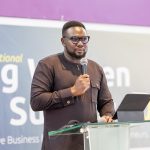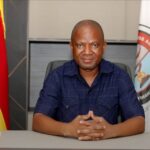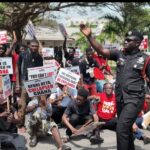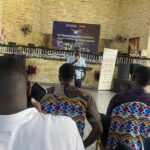
The Network of Women Leaders for Development (RFLD), a Pan-African organization dedicated to empowering women and youth while advancing gender justice and human rights, successfully hosted a high-level regional training on Human Rights Risk Detection, Early Warning, and Advocacy in Africa.
The two-day workshop, held from November 14–15, 2025, at the Mensvic Grand Hotel in East Legon, Accra, brought together over 30 civil society actors, activists, and human rights defenders from across the continent.

Organized by RFLD with support from the EU SEE Programme, the African Commission on Human and People’s Rights (ACHPR), the West Africa Democracy Solidarity Network (WADEMOS), and the West Africa Civil Society Institute (WACSI), the training aimed to strengthen the capacities of frontline defenders in addressing emerging threats to human rights and navigating increasingly restrictive civic spaces.
The workshop employed interactive and participatory methodologies, including case study analyses, group exercises, role-playing simulations, multimedia presentations, and testimonies from experienced practitioners.
This approach enabled participants to engage with real-world scenarios and develop practical skills to respond effectively to human rights challenges across Africa.
During the opening session, Mr. John Gbenagnon, Senior Officer at RFLD in charge of Partnerships and Resource Mobilization, provided participants with a detailed overview of the training objectives and agenda.
He highlighted the strategic importance of equipping civil society actors with early warning and advocacy skills.
“The primary objective of this training,” Mr. Gbenagnon explained, “is to strengthen the capacity of human rights defenders and civil society actors across Africa to detect early warning signals of rights violations and translate them into effective advocacy strategies.
Over the next two days, participants will engage in interactive sessions, practical exercises, and collaborative discussions designed to enhance their skills in data collection, analysis, and actionable planning.”
He further added, “This workshop has been thoughtfully designed to combine theoretical knowledge with practical tools. From case studies and role-playing scenarios to multimedia presentations and testimonies from experienced practitioners, the agenda ensures participants leave with skills they can immediately apply within their organizations and communities.
RFLD, together with our partners, aims to build a sustainable network of defenders who can support one another, share insights, and collectively respond to emerging threats to human rights across the continent.”
By the conclusion of the training, the 30+ participants had developed a comprehensive understanding of early warning systems architecture and its relevance to human rights protection.
They strengthened their ability to identify and analyze human rights risk indicators, acquired practical skills in data collection and analysis, learned how to transform early warning signals into effective advocacy strategies, and produced actionable early warning and advocacy plans tailored to their organizational and national contexts.
Dr. Pascal Dohou of CIVICUS delivered the opening remarks, underscoring the importance of sustained collaboration across Africa. “Although CIVICUS is a global programme, today we stand here as an African team,” he said.
“We appreciate your time and commitment—especially over the weekend. These engagements will continue across the continent to ensure defenders remain equipped to respond to emerging threats.”
Paul Osei Kuffour, Network Coordinator of WADEMOS, emphasized the workshop’s timeliness. “With the weaponization of civic space and the reprisals faced by activists in West Africa, defenders must rethink, reimagine, and rekindle their strategies,” he said.
He noted that WADEMOS, established by CDD-Ghana, was created in response to democratic decline, cross-border repression, and the resurgence of military coups in the region.
Representing Hivos East Africa, Onyonge Mengo stressed the importance of data-driven advocacy. “EU SEE supports civil society in 86 countries, and we are pleased to support this initiative to help ACHPR and other mechanisms leverage reliable data for human rights advocacy across Africa,” she said.
Delivering a message during the event, Prof. Remy Ngoy Lumbu, Special Rapporteur on Human Rights Defenders, encouraged participants to extend the knowledge gained beyond the training room.
“This is not just a training—it is an educational platform designed to produce real impact,” he said. He commended RFLD and partners for mobilizing the resources necessary to assemble a diverse group of human rights defenders from across the continent.
Omolara Balogun of WACSI highlighted the urgent need for civil society resilience amid disruptions to democracy. “As some global partners gradually retreat, African civil society must take leadership in driving justice, accountability, and people-centered development,” she emphasized.
The high-level training concluded with a renewed commitment among the participants and partner organizations to strengthen cross-country collaboration, reinforce early warning networks, and promote evidence-based advocacy.

RFLD expressed confidence that the strategies and skills shared during the workshop would significantly contribute to defending and expanding civic space, particularly for women, youth, and marginalized communities, across Africa.







